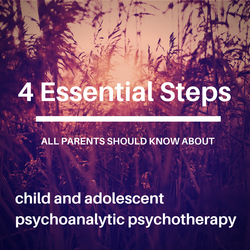
Step 1: The diagnostic assessment: This typically takes between 4 to 5 sessions and allows me to assess the history of the presenting problem, the psycho-social and developmental history of the child/adolescent and their current academic, social and family functioning.
- Meeting with the parents: Usually, I request to meet with the parents first so that I can hear their concerns and begin gathering psycho-social and developmental history of the child. If the child is an adolescent, this may happen over the phone but I do request to meet with parents personally so that we can work together to best help their kid. In addition, I often meet with each parent individually as well to discuss their perspective of the child's struggles and assess the family environment.
- Meetings with the child: Then, I like to spend a few sessions to get to know my young client and hear their point of view on what is bothering them as well as to conduct my diagnostic assessment. What we discuss in our sessions is confidential, meaning that I cannot disclose details to parents about what the child says to me unless it poses a threat to the child's safety, which often helps them feel more comfortable and engaged with me.
- Collaboration with teachers, school social workers and mental health professionals, who know and work with the child/adolescent. Depending on the severity of the child's struggles, I like to connect with other professionals in his/her life to get their insight and to gather a full diagnostic picture of the kids' functioning. Often, I collaborate with schools, especially if there is a concern in that area of functioning.
Step 2: Diagnostic impressions and treatment recommendations: At the end of the assessment process, I offer the parents my clinical impressions and treatment recommendations necessary to meet the social and emotional needs of their child, including the intensity of the therapy and the frequency of the sessions. Sometimes, I make other recommendations such as suggesting a neuropsychological or psychiatric evaluation, behavioral interventions at home, suggestions for teachers, etc.
Step 3: The therapeutic process:
- How often will I see the child: Children have a different perception of time than adults and once a week sessions is often not enough, at least at the beginning, when things feel chaotic and out of control. For this reason, I like to see younger children on a biweekly basis - a week feels too long in-between sessions for them to make the best use of the treatment. Teenagers, especially higher functioning ones, have a more adult perception of time and once a week is usually sufficient. If your kid is really struggling at home and at school, was recently hospitalized or threatened harm to themselves or others, regardless of their age, s/he may need a more intensive course of psychotherapy, somewhere between two to four times a week.
- How long will the therapy last: It depends of the nature of your kid's struggles. Some children and adolescents are able to overcome their symptoms and return to developmentally appropriate activities within 6 to 9 months of treatment, others, whose social and emotional difficulties are greater, may need between one and two years of treatment.
- How involved do parents need to be in their child's treatment? I always collaborate with the family to ensure a deeper understanding of the child's struggles and a long-lasting change. I welcome and encourage parents' participation in the treatment and offer to meet with them as many times as necessary in addition to the individual sessions with the child. Sometimes, I incorporate family therapy sessions and parenting counseling to help the family implement changes and interventions in their home environment.
Step 4. Termination: Finally, it is important that after the family, the child and I have all agreed that progress has been made and the struggles that the child initially came to work on have been resolved, I like to spend time working on ending the therapeutic relationship to ensure that the child will be able to maintain their progress once we are no longer meeting. There is always an option to return if other struggles should arise but it is important to allow for a time to say goodbye.
Found this article helpful? For more articles on common mental health issues, affecting you and your family, subscribe to Mental Health Digest and get the latest issue emailed to you today by leaving your name and email address in the contact form here.
Do you have questions? I would love to hear from you.
12 Signs that Your Teen Needs Psychoanalytic Psychotherapy



 RSS Feed
RSS Feed